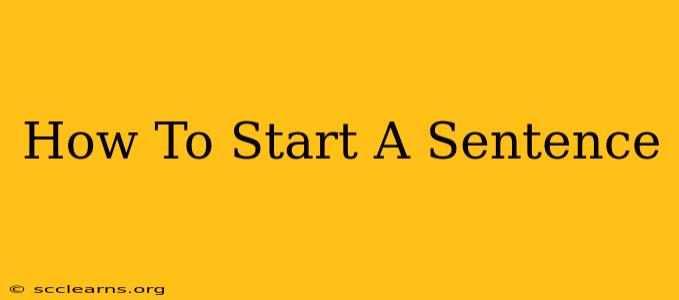How To Start a Sentence: A Guide to Engaging and Effective Writing
Starting a sentence might seem simple, but mastering this fundamental skill significantly impacts your writing's clarity, flow, and overall impact. A well-crafted opening instantly grabs the reader's attention, setting the tone and paving the way for a compelling narrative. This comprehensive guide explores various techniques to craft captivating sentence starters, transforming your writing from mundane to memorable.
Why Sentence Starters Matter
The way you begin a sentence isn't just about grammar; it's about engagement. A string of sentences starting the same way – for example, with "The" or "And" – creates monotonous and dull prose. Varied sentence structures keep readers hooked, preventing them from getting lost or bored. Strong sentence starters also improve the readability of your text, making it easier to understand and follow. Consider these benefits:
- Improved Clarity: Strategic sentence starters ensure smooth transitions between ideas.
- Enhanced Flow: Varied openings create a rhythm that guides the reader through your text.
- Increased Engagement: Intriguing sentence beginnings pique curiosity and encourage further reading.
- Stronger Voice: Unique sentence starters reflect your individual writing style and personality.
Diverse Ways to Start a Sentence: Beyond the Basics
Moving beyond the typical "The," "A," or "It," let's explore a range of compelling options:
1. Using Adverbs: Adverbs immediately set the tone and modify the verb. Examples include:
- Suddenly, the lights went out.
- Gently, she placed the flower on the table.
- Thankfully, the rain stopped.
2. Employing Adjectives: This creates a vivid image and describes the subject.
- Magnificent, the castle stood atop the hill.
- Tired, he slumped into his chair.
- Intriguing, the mystery unfolded slowly.
3. Starting with Prepositional Phrases: This creates context and adds depth to your writing.
- In the distance, a lone wolf howled.
- Beneath the surface, a hidden truth lay concealed.
- Despite the odds, she persevered.
4. Utilizing Strong Verbs: A powerful verb immediately engages the reader and sets the action in motion.
- Exploded, the volcano sent ash into the sky.
- Whispered, she shared the secret.
- Soared, the eagle above the majestic mountains.
5. Incorporating Conjunctive Adverbs: These words connect ideas smoothly and add a nuanced perspective.
- Moreover, the evidence pointed towards a different conclusion.
- However, the plan faced unexpected challenges.
- Therefore, we decided to proceed cautiously.
6. Beginning with Participial Phrases: These phrases add descriptive details while keeping the sentence concise.
- Running swiftly, the athlete crossed the finish line.
- Lost in thought, she walked unaware of her surroundings.
- Filled with excitement, the children eagerly awaited Christmas morning.
7. Using Questions: This immediately draws the reader in and encourages active participation.
- What if we tried a different approach?
- How could this have happened?
- Why did they choose that path?
8. Starting with a Quotation: This can add weight, authority, or a touch of humor. (Always properly attribute the source).
- "The only way to do great work is to love what you do," said Steve Jobs.
- "To be or not to be," Hamlet mused.
Practicing Your Sentence Starters
The key to mastering sentence starters is practice. Read widely to observe how professional writers craft their sentences. Analyze their techniques, and experiment with different approaches in your own writing. Pay attention to the rhythm and flow, ensuring a natural and engaging reading experience. Don't be afraid to experiment and find what works best for your unique style. The more you practice, the more naturally you'll diversify your sentence beginnings, resulting in polished and captivating writing.

